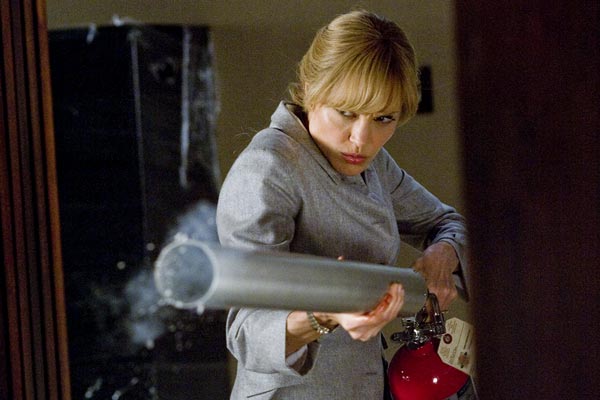“Who is Salt?” inquires the promotional push for the latest Angelina Jolie-starring spy thriller from Columbia Pictures. It’s a question we ponder often during the film, and one whose answer is well explored, unexpected, and not so simple, really.
The story proper begins like a punch-line: so a guy walks into the Central Intelligence Agency… and informs that one of their agents is actually a Soviet spy. Though Evelyn Salt, played by Ms. Jolie, strictly denies the accusation, she also makes a point to flee. As CIA agents (including Liev Schreiber and Chiwetel Ejiofor) chase down the presumed defector, the film unfurls a string of Cold War intrigue that extends from a lonely prison cell in North Korea to a fortified bunker eight stories beneath the White House.
I was tempted to find the subject matter here a bit antiquated—but how can I? With the recent Russian spy exchange and a climate of political discourse that not so infrequently suggests comparison to a Soviet regime, these are suddenly topics of our times. The timing on the former, in fact, is so serendipitous that a deeply cynical part of me has to believe Columbia Pictures had a hand in it. (Of course, the realist in me recognizes the absurdity of this suspicion… but you know the folks at Columbia popped open the champagne when the “Russian Spies Arrested” headlines broke.)
A script by Kurt Wimmer is standard, if not slightly sharper, delusionary spy-movie stuff, but two major talents—one in front of and one behind the camera lens—significantly elevate the material. Director Philip Noyce wields tightened frames and a precise focus, keeping us tuned in and on our toes. Even as plot begins to buckle under heady topics (JFK assassination conspiracy, nuclear missile launch codes, and the like), Noyce maintains clean execution at a pulsating tempo.
But Noyce’s efforts are for naught without a strong leading figure holding the film together. Angelina Jolie as the titled femme fatale possesses the perfect balance of intensity and vulnerability to convey a convincing and appealing action heroine. She’s as cool as dry ice when in full-out butt-kicking mode, and then almost ethereal in rarer moments of warmth. If anything hampers her portrayal, it’s Jolie’s immeasurable star-power wattage; it can be difficult to separate “Angelina Jolie as Salt” from “Angelina Jolie as universal celebrity phenom.”
Salt works best when limited to an arena manageable by the duo of Noyce and Jolie—to the simple story of a spy on the run, with the stakes heightened by the enigma of Salt. In these moments, the film is taut, tense, and terrific, as when Salt makes her first escape from the CIA complex: she flicks off her heels, sidewinders her way onto an abandoned floor, and “MacGyvers” an explosive exit. The sheer excitement generated here would put most bloated CGI spectacles to shame.
So who is Salt, then? I wouldn’t want to spoil the fun by telling you flat-out, but on a more conceptual level, we experience “Salt” in many forms. There’s Salt the desk clerk, versus Salt the fleeing operative, versus Salt the steely cyborg; Salt the secret agent, versus Salt the double-crosser, versus Salt the loyal lover. There’s Salt with blonde hair, Salt with dark hair, Salt with short hair, Salt with long hair; even Salt the female fighter versus Salt the masculinized manipulator (sporting the proper concealments and a boxy suit).
The fluid identity and physicality of Salt challenges our perceptions and expectations of gender roles in film, as each version of Salt tests our instinctive response to a particular physical form—all while propagating a surface layer of crackling intrigue. In this sense, Salt is high-caliber entertainment with a shrewd social subtext: a slick popcorn picture with a side of brain food to boot.

Directed by Phillip Noyce. Written by Kurt Wimmer. Rated PG-13 for intense sequences of violence and action. Runtime is 1 hour, 40 minutes.
Tickets & Showtimes» Watch the Trailer» Visit the Website»
Also opening this week, a far more bounteous examination of gender roles and expectations in Focus Features‘ comedic gem The Kids Are All Right. Whip-smart and supremely acted, the film portrays a fairly conventional family with an unconventional twist: two mothers in place of a nuclear parental pair. Annette Bening lends an Oscar-bound performance to uptight obstetrician Nic, with an unusually perceptive Julianne Moore in the role of her breezier partner Jules.
As their daughter Joni (a ravishing Mia Wasikowska) prepares to leave for college, her younger brother Laser (Josh Hutcherson, unexpectedly astute) suggests, out of simple curiosity, that they contact their biological father (each was conceived via the same donor sperm in either parent). They arrange to meet with him, and he, named Paul (Mark Ruffalo, rarely in finer form), enters their lives as an undefined external entity, dramatically changing the family dynamic.
Writer-director Lisa Cholodenko (the script was also written by Stuart Blumberg) crafts a gorgeously authentic environment with real, relatable characters—feats, flaws, and all. Everyone learns from and plays off of one another brilliantly, and the shared experience is also an occasion for shared growth. The sunny Californian skies (occasionally retina-burning) give way to plenty that will make you blush, giddy with glee, and achy with laughter.
But Cholodenko does not use the presence of her leading couple for spectacle; Nic and Jules provide a prism through which we can reexamine every beat of our society. That they are same-sex parents is never the final point: it’s how their lives and the lives of those around them are affected, even enlivened, by this fact—from the small, endearing details (the kids refer to their parents as the collective “moms”) to the greater ramifications (Laser’s apparent need for a positive male role model).
Ultimately, though, the sex or sexual orientation of any character is quite the afterthought. This is a family just like any other, with tender moments, tougher times, insights, affections, issues, and desires. And every bit is so well realized that you’ll feel like you’re a part of it all. It’s truly rare that such a simple story feels at once so challenging, entertaining, and, particularly during the final stretch, downright touching.
Fifty years from now, The Kids Are All Right may feel as innocuous as Guess Who’s Coming to Dinner does today. But for the time being, this is revelatory stuff.

Directed by Lisa Cholodenko. Written by Lisa Cholodenko & Stuart Blumberg. Rated R for strong sexual content, nudity, language and some teen drug and alcohol use. Runtime is 1 hour, 44 minutes.
Showtimes @ The Charles» Watch the Trailer» Visit the Website»







You think Salt is brain food but Inception is a boatload of flaws? I don’t think I can trust your opinion sir. You should probably stop writing movie reviews because you clearly have no idea what your talking about.
I saw Salt last night with some friends. We thought it was great! I mean yeah it was pretty ridiculous, but you barely notice because it all zooms by so fast. And Angelina Jolie was actually really effective. I mean she’s not Jason Bourne, but she’s at least as cool as Bond!
Yeah your movie reviews are typically way off. It’s like you review a movie with what you think other critics would want you to say. I mean really the kids are alright gets 4 stars?? I am SHOCKED, I mean SHOCKED that you picked that. Every artsy wanna be family heart warmer you watch get’s 4 stars. Instead of the movie quality and ENTERTAINMENT value ( isn’t that why we watch movies?) you are more concerned with Oscar worthy performances. Lets try to actually reviewing a movie with an honest opinion instead of writing what you *think* you should say, I mean I know a wouldn’t want the other movie critics to actually think I had a mind of my own. Where would you be today if Siskle always gave a thumb up just because Ebert did??
You know some of us are entertained by ‘artsy, oscar-worthy performance’ films. It’s called standards. Not that Transformers 2 doesn’t have standards; they are just low enough to be barely distinguishable.
To your point (I think), reviews are the writers opinion. Perhaps they coincide with other critics opinions because most critics see the same films, mainstream and otherwise, and base their reviews off a larger selection of movie pools.
Perhaps you can offer some films to contrast with The Kids Are Alright. Or write a review for films you like. I would be shocked, I mean shocked, if everyone agreed with your perception.
The only review I disagreed with so far was the A team, and I’d bet it’s because you are too young to have watched the tv series.
That movie met the expectations of the typical viewer of that fare.
But the rest of your reviews have been spot on in my opinion,
though it’s fair to say you have higher standards than the average viewer.